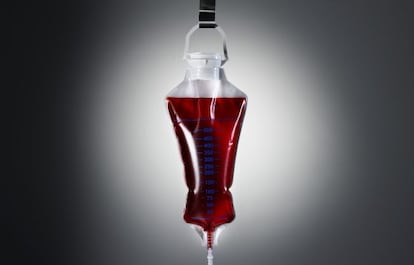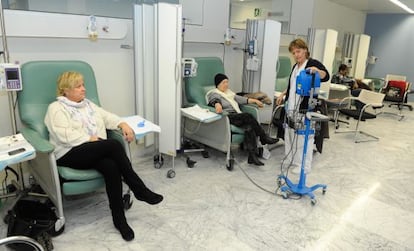Spanish medical team presents “liquid biopsy” for cancer patients
Catalan VHIO research center is working on non-invasive method to find best treatment


“Blood is like the human body’s waste dump,” explains Josep Tabernero, director of the Catalan cancer research center Vall d’Hebron Instituto de Oncología (VHIO).
And just like investigators who rummage through the trash in search of clues to solve a crime, doctors have been analyzing human blood for decades in search of signs of cancer.
Until now, doctors had to perform a biopsy on solid tissue to obtain a tiny piece of the tumor and analyze it
Now that precision medicine is taking its first steps to find medical treatment tailored to each patient’s needs, blood samples are going to become even more relevant in the fight against the deadliest disease in the developed world: cancer.
At an official presentation in Barcelona last month, health professionals presented a technology based on liquid biopsies that will search a patient’s blood for signs of the type of tumor affecting them.
The VHIO is the first center in the world to offer liquid biopsy RAS biomarker tests, a service by which a blood sample can tell sufferers of metastatic colorectal cancer whether they have a mutation of the RAS gene. This information is useful for predicting how a treatment will work in a specific case.
Between 55 and 65 percent of patients with this type of cancer have this mutation, and do not respond to therapy with cetuximab and panitumumab, which is effective with other genetic mutations.
Up until now, in order to obtain that kind of information, doctors had to perform a biopsy on solid tissue or a surgical procedure to obtain a tiny piece of the tumor and analyze it. These are invasive procedures that cannot be frequently repeated.
In a disease like cancer, which has a great ability to adapt to varying circumstances and treatments, having access to updated information can be critical in selecting the right battle tools. An RAS mutation could force medics to change a treatment that was successful until then.

Another advantage to liquid biopsies, which will not replace traditional ones but seek to complement them, is the shorter waiting times for results – just two or three days.
Also, information gleaned from blood “is more representative of what is happening in the organism than a biopsy of a specific tissue,” noted Tabernero.
The technology required to develop this kind of test was developed by Sysmex Inostics and will be implemented by the pharmaceutical firm Merck.
Besides VHIO, the world pioneer, 19 other health centers in Spain are working with both companies to adopt the technique.
One of these is Madrid’s Hospital Clínico San Carlos, whose head of medical oncology, Eduardo Díaz Rubio, explains that they are still at the research stage.
Having access to updated information can be critical in selecting the right battle tools
“We still lack the necessary knowledge to make decisions based on this information, because we still need to validate that what we find in the blood is the same as we find in the tissue biopsies,” he says.
However, “in a few months liquid biopsies will be a reality” and will help “find out which patients are truly benefiting from a treatment, and not subject the patient to a treatment that doesn’t work.”
Because the sophisticated technology requires personnel trained in cell biology, it will not be available at all hospitals. But Jesús García-Foncillas, director of the oncology department at Madrid’s Hospital Universitario Fundación Jiménez Díaz – which is also on the list of collaborating centers – says that patients from centers that lack the technology will still benefit.
“When a patient has colorectal cancer and his doctor wants to know if he has the RAS mutation, the latter can call a hotline to request that a blood sample be taken to a lab for testing,” he said.
Belén Garijo, a member of Merck’s executive committee, said they expect the technology to be available at 50 European centers within the next three years. Fernando Andreu, president of Sysmex Inostics, said his company is already working on developing similar analyses for patients with lung and breast cancer.
Tu suscripción se está usando en otro dispositivo
¿Quieres añadir otro usuario a tu suscripción?
Si continúas leyendo en este dispositivo, no se podrá leer en el otro.
FlechaTu suscripción se está usando en otro dispositivo y solo puedes acceder a EL PAÍS desde un dispositivo a la vez.
Si quieres compartir tu cuenta, cambia tu suscripción a la modalidad Premium, así podrás añadir otro usuario. Cada uno accederá con su propia cuenta de email, lo que os permitirá personalizar vuestra experiencia en EL PAÍS.
¿Tienes una suscripción de empresa? Accede aquí para contratar más cuentas.
En el caso de no saber quién está usando tu cuenta, te recomendamos cambiar tu contraseña aquí.
Si decides continuar compartiendo tu cuenta, este mensaje se mostrará en tu dispositivo y en el de la otra persona que está usando tu cuenta de forma indefinida, afectando a tu experiencia de lectura. Puedes consultar aquí los términos y condiciones de la suscripción digital.








































